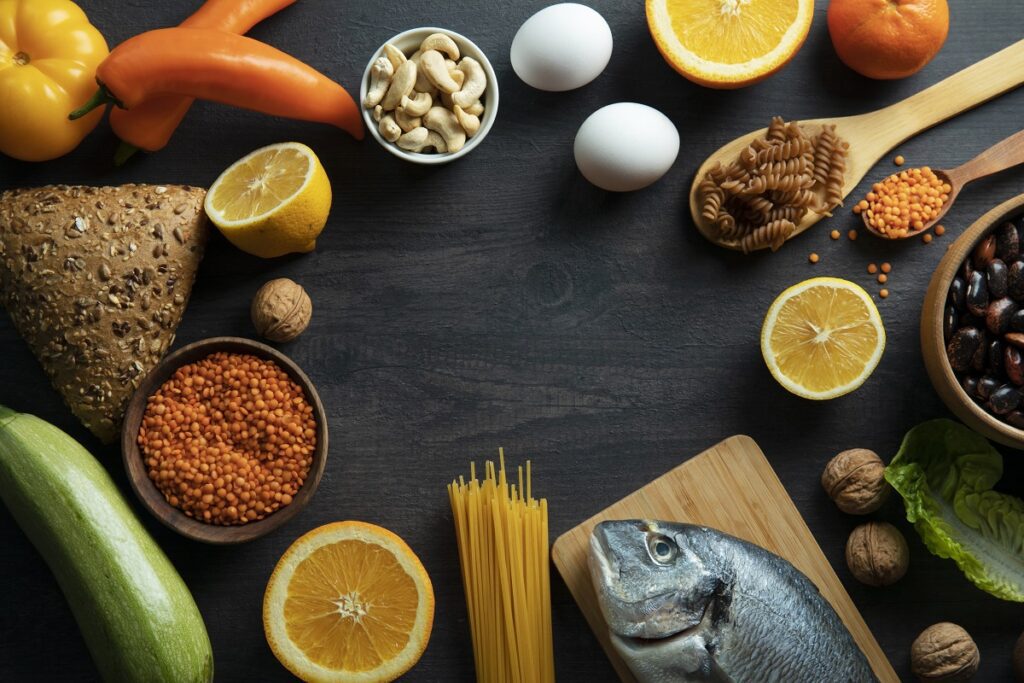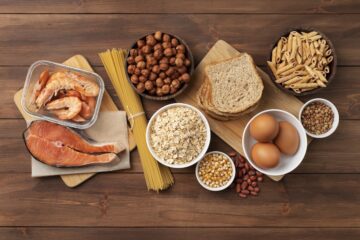Iodine is a vital trace mineral that plays an essential role in the production of thyroid hormones, which regulate metabolism, growth, and overall energy production in the body. Without enough iodine, the thyroid gland cannot function properly, leading to a range of health issues, including goiter (enlarged thyroid), hypothyroidism, developmental delays, and cognitive impairments. According to the World Health Organization (WHO), iodine deficiency is one of the leading preventable causes of brain damage worldwide, affecting nearly two billion people.
Incorporating iodine-rich foods into your diet is one of the best ways to ensure your body gets an adequate amount of this nutrient. This article will explore a wide variety of foods high in iodine, from seafood to dairy and plant-based sources, as well as how to balance iodine intake and avoid deficiency or excess.

Why Iodine is Important
Before diving into iodine-rich foods, it’s crucial to understand why iodine is so important to human health. Iodine is primarily used by the thyroid gland, located in the neck, to produce two important hormones: thyroxine (T4) and triiodothyronine (T3). These hormones are responsible for controlling the metabolic rate of cells, regulating the body’s energy levels, and supporting proper growth and development, especially during pregnancy and early childhood.
A lack of iodine can lead to a condition known as iodine deficiency disorder (IDD). Symptoms of IDD include fatigue, weight gain, dry skin, hair loss, and depression. Severe iodine deficiency during pregnancy can result in miscarriages, stillbirths, and congenital abnormalities, including cretinism, a condition that causes severe intellectual disabilities and stunted growth in infants. On the other hand, excessive iodine intake can also lead to thyroid dysfunction, so it’s important to strike a balance.
How Much Iodine Do You Need?
The amount of iodine a person needs depends on their age and life stage. According to the National Institutes of Health (NIH), the Recommended Daily Allowance (RDA) for iodine is as follows:
- Infants (0-6 months): 110 micrograms (mcg) per day
- Infants (7-12 months): 130 mcg per day
- Children (1-8 years): 90 mcg per day
- Children (9-13 years): 120 mcg per day
- Teens (14-18 years) and Adults: 150 mcg per day
- Pregnant women: 220 mcg per day
- Breastfeeding women: 290 mcg per day
Given that the body doesn’t produce iodine naturally, it’s essential to get it through your diet. Below is a comprehensive guide to foods high in iodine.
1. Seaweed
Seaweed is one of the richest natural sources of iodine. In fact, seaweed can contain anywhere from 16 to 2,984 micrograms of iodine per serving, depending on the type. The most commonly consumed seaweeds are kelp, nori, wakame, and kombu.
- Kelp: Kelp is the iodine powerhouse, providing up to 2,984 mcg per gram in some cases, far exceeding the RDA.
- Nori: Nori, commonly used in sushi, contains a more moderate amount of iodine, typically around 16-43 mcg per gram.
- Wakame: Wakame, often found in salads and soups, contains around 52 mcg per gram.
- Kombu: Kombu, a brown seaweed often used in Japanese cooking, contains some of the highest iodine levels, with just one gram providing over 2,000 mcg.
While seaweed is incredibly rich in iodine, it’s important to consume it in moderation, especially kelp and kombu, as excessive intake can lead to thyroid problems.
2. Fish and Seafood
Fish and seafood are excellent sources of iodine due to their exposure to iodine-rich seawater. Here are some of the top iodine-rich fish and seafood:
- Cod: A lean white fish, cod is an excellent source of iodine, providing approximately 158 mcg per 3-ounce serving. It’s also rich in other nutrients like protein and vitamin B12.
- Shrimp: Shrimp are naturally high in iodine, with about 35 mcg per 3-ounce serving. They’re also a good source of protein and low in calories.
- Tuna: Canned tuna contains about 17 mcg of iodine per 3-ounce serving. It’s also a rich source of omega-3 fatty acids and vitamin D.
- Oysters: Oysters are packed with a variety of nutrients, including iodine. A 3-ounce serving of oysters provides about 93 mcg of iodine.
3. Dairy Products
Dairy products are one of the most common sources of iodine in Western diets. The iodine content in dairy products can vary depending on the type of feed given to cows, but in general, dairy is a reliable source. Some iodine-rich dairy products include:
- Milk: One cup of cow’s milk contains about 85 mcg of iodine, which is more than half of the recommended daily intake for adults.
- Yogurt: Yogurt is another excellent source of iodine, with one cup of plain yogurt providing approximately 75 mcg.
- Cheese: Cheese, particularly cheddar, contains about 15 mcg of iodine per ounce.
The iodine in dairy products comes from the iodine added to cattle feed and the use of iodine-based cleaners in the dairy industry.
4. Eggs
Eggs are a versatile and nutritious food that provides a moderate amount of iodine. Most of the iodine in eggs is found in the yolk, with one large egg providing around 24 mcg of iodine. Eggs are also an excellent source of protein, vitamin D, and choline, making them a valuable addition to any balanced diet.
5. Iodized Salt
One of the easiest ways to ensure adequate iodine intake is by using iodized salt. Iodized salt is regular table salt that has been fortified with iodine. Just 1/4 teaspoon of iodized salt provides around 71 mcg of iodine, nearly half of the daily recommended intake for adults. However, it’s important to note that while iodized salt can help prevent iodine deficiency, consuming too much salt can lead to other health problems, such as high blood pressure. Therefore, moderation is key.
6. Bread and Grains
In some countries, iodine is added to bread and grains during the manufacturing process to help combat iodine deficiency. The iodine content in bread and grains can vary, but some types of commercially prepared bread can provide 20-30 mcg of iodine per slice. However, not all bread is iodized, so it’s important to check the packaging or ingredient list for iodine fortification.
7. Fruits and Vegetables
While fruits and vegetables are not typically high in iodine, certain ones contain moderate amounts depending on the iodine content of the soil they were grown in. Some fruits and vegetables that can provide small amounts of iodine include:
- Cranberries: A serving of cranberries can contain around 400 mcg of iodine, making them a surprisingly good source of this nutrient.
- Potatoes: A medium-sized potato with the skin on provides about 60 mcg of iodine, making it a decent source of iodine from a plant-based food.
- Strawberries: A cup of strawberries provides around 13 mcg of iodine.
The iodine content of fruits and vegetables depends on the iodine levels in the soil, which can vary greatly depending on geographic location.
8. Fortified Foods
In many countries, iodine is added to various foods to help prevent iodine deficiency. Fortified foods may include:
- Infant formulas: Many infant formulas are fortified with iodine to ensure proper growth and development.
- Breakfast cereals: Some brands of cereal may be fortified with iodine, providing around 10-15% of the daily recommended intake per serving.
- Plant-based milks: Some plant-based milks, such as soy milk and almond milk, may be fortified with iodine, though the amounts can vary widely depending on the brand.
9. Beef Liver
Beef liver is another excellent source of iodine, with a 3-ounce serving providing approximately 14 mcg of iodine. In addition to iodine, beef liver is rich in vitamin A, iron, and other important nutrients that support overall health.
10. Chicken and Turkey
Poultry, such as chicken and turkey, can also contribute to iodine intake, though they contain less iodine than seafood and dairy products. A 3-ounce serving of chicken breast provides about 7 mcg of iodine, while turkey breast contains around 34 mcg per serving.
How to Balance Iodine Intake
While it’s important to ensure you’re getting enough iodine, it’s equally important to avoid excessive iodine intake. Consuming too much iodine, often from supplements or over consumption of iodine-rich foods like kelp, can lead to thyroid dysfunction, including hyperthyroidism or hypothyroidism.
Conclusion
Iodine is an essential mineral that plays a critical role in thyroid function and overall health. By incorporating a variety of iodine-rich foods such as seaweed, seafood, dairy, eggs, and iodized salt into your diet, you can ensure you’re meeting your daily iodine needs. Whether you follow a plant-based diet or consume animal products, there are plenty of ways to include iodine in your meals.
To achieve optimal health, it’s important to find a balance in your iodine intake and consult with a healthcare provider if you have concerns about deficiency or excess. Maintaining healthy iodine levels supports metabolism, cognitive function, and growth, helping you live a more energized and balanced life.


